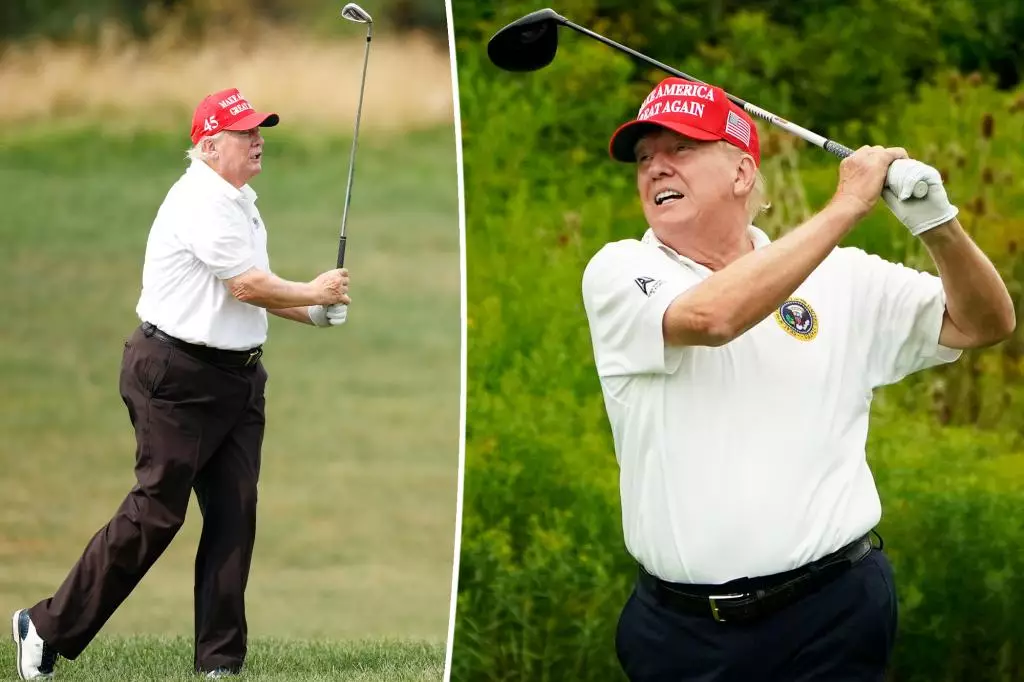In a surprising turn of events, Donald Trump, the former President of the United States, has been captured enjoying leisurely days on the golf course with his granddaughters, Kai and Chloe Trump, alongside tech magnate Elon Musk. However, whispers from insiders suggest that the president-elect is prepared to trade in his golf clubs for the weighty responsibilities of the Oval Office. The implications of this decision extend far beyond personal leisure, reflecting on the historical precedent set by past presidents and the demands of his upcoming administration.
Golf has long been intertwined with the presidency, with many leaders using it as a way to relax, network, and strategize. From Dwight Eisenhower to Barack Obama, the links have served as an informal backdrop to political negotiations and camaraderie. But Trump’s approach seems to deviate from this tradition as he contemplates a shift away from the sport that has defined much of his leisure time. According to sources, Trump has expressed to his golf circle that the time has come to prioritize national affairs over recreational activities, essentially declaring an end to regular games with his golf buddies.
While the shift may invoke a sense of loss among his ranks of golfing peers, it also brings to light the evolving expectations of presidential conduct. Trump’s determination to set aside his golf habits indicates not just a personal choice but a recognition of the substantial security concerns and the critical need for effective governance that now accompany his position. This decision may be seen as an attempt to mitigate criticism from the public and the media regarding the perceived indulgences of past presidents.
Sources close to Trump assert that although he intends to scale back his golfing, he is not considering total abandonment of the sport. Instead, the former president may reserve the links for “working games” or high-profile meetings with significant political allies and donors. Such occasions could serve as both a form of leisure and a strategic venue for political discussions. For example, collaborations with figures such as Lindsey Graham or occasional outings with Musk could still play a role, albeit in a more restrained manner.
This pragmatic approach reflects an understanding that time management is paramount for a president. With pressing issues looming—from national security threats to socio-economic challenges—Trump’s decision speaks volumes about the reality of the modern political landscape. His words to friends indicating that “weekly games are on hold until the country is back on track” signal a newfound seriousness in his commitment to governance, a lesson that might resonate deeply during a time of political division.
Another significant factor contributing to Trump’s golfing hiatus are the elevated security risks he faces. Following an assassination attempt near one of his golf properties, a tense reality has settled over the notion of leisure activities. The input from federal agents concerning limitations in ensuring Trump’s safety while on the course has undoubtedly influenced his decision-making. These concerns highlight the complex dynamics between safety and leisure for a former head of state.
Trump’s prior enthusiasm for golf, which reportedly amounted to over 260 days spent at various golf properties during his previous term, may endure but in a modified format. As he adopts a more vigilant approach, it will be fascinating to see how he reconciles his passion for the game with the gravity of his leadership role.
A further element worth analyzing is Trump’s historical criticism of former President Obama for his golf outings during tumultuous times. During his campaign against Hillary Clinton, Trump vehemently questioned Obama’s priorities and rightfully pointed to the optics of a sitting president enjoying leisure while significant national issues were at hand. The potential irony in Trump now positioning himself similarly brings to light the dualities of political critique and personal choice.
As Trump embarks on this new chapter in his political career, the impact of his choices—whether they include golf or strategic retreats—is likely to shape public perception and influence the governance narrative. Balancing personal interests with state responsibilities will be a delicate task, one with repercussions that may echo throughout his administration and beyond.
Trump’s evolving relationship with golf underscores the broader challenges faced by modern politicians. The intertwining of personal passion and public service is a theme as old as politics itself. Yet, as the landscape shifts, so too must the leaders who navigate it, balancing recreation with the unrelenting demands of governance.


Leave a Reply